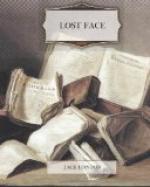“And you believe this?” Sister Alberta asked.
“I do not know,” El-Soo made answer. “It was my father’s belief.”
Sister Alberta shrugged her shoulders incredulously.
“Who knows but that the things we believe come true?” El-Soo went on. “Why not? The next world to you may be heaven and harps . . . because you have believed heaven and harps; to my father the next world may be a large house where he will sit always at table feasting with God.”
“And you?” Sister Alberta asked. “What is your next world?”
El-Soo hesitated but for a moment. “I should like a little of both,” she said. “I should like to see your face as well as the face of my father.”
The day of the auction came. Tana-naw Station was populous. As was their custom, the tribes had gathered to await the salmon-run, and in the meantime spent the time in dancing and frolicking, trading and gossiping. Then there was the ordinary sprinkling of white adventurers, traders, and prospectors, and, in addition, a large number of white men who had come because of curiosity or interest in the affair.
It had been a backward spring, and the salmon were late in running. This delay but keyed up the interest. Then, on the day of the auction, the situation was made tense by Akoon. He arose and made public and solemn announcement that whosoever bought El-Soo would forthwith and immediately die. He flourished the Winchester in his hand to indicate the manner of the taking-off. El-Soo was angered thereat; but he refused to speak with her, and went to the trading post to lay in extra ammunition.
The first salmon was caught at ten o’clock in the evening, and at midnight the auction began. It took place on top of the high bank alongside the Yukon. The sun was due north just below the horizon, and the sky was lurid red. A great crowd gathered about the table and the two chairs that stood near the edge of the bank. To the fore were many white men and several chiefs. And most prominently to the fore, rifle in hand, stood Akoon. Tommy, at El-Soo’s request, served as auctioneer, but she made the opening speech and described the goods about to be sold. She was in native costume, in the dress of a chief’s daughter, splendid and barbaric, and she stood on a chair, that she might be seen to advantage.
“Who will buy a wife?” she asked. “Look at me. I am twenty years old and a maid. I will be a good wife to the man who buys me. If he is a white man, I shall dress in the fashion of white women; if he is an Indian, I shall dress as”—she hesitated a moment—“a squaw. I can make my own clothes, and sew, and wash, and mend. I was taught for eight years to do these things at Holy Cross Mission. I can read and write English, and I know how to play the organ. Also I can do arithmetic and some algebra—a little. I shall be sold to the highest bidder, and to him I will make out a bill of sale of myself. I forgot to say that I can sing very well, and that I have never been sick in my life. I weigh one hundred and thirty-two pounds; my father is dead and I have no relatives. Who wants me?”




